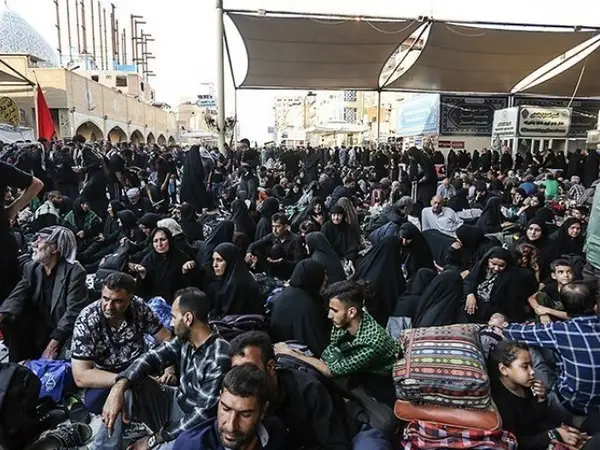A massive Iranian pilgrimage to Iraq’s Karbala, encouraged and supported by the government was mismanaged and aborted, turning into an embarrassing debacle.
Pilgrims have been stranded at dangerously overcrowded border checkpoints and on the roads in the past few days. According to health authorities many of the pilgrims, including very young infants and the elderly, have been heat stricken due to the very hot and humid weather, or fallen ill with symptoms such as dizziness, nausea, and stomach cramps.
On Friday, Iran and Iraq closed all border crossings, suspending the pilgrimage due to “safety concerns”. Hundreds of thousands who already crossed into Iraq have great difficulty finding local transportation and housing. Photos emerged of thousands of Iranians sleeping in the streets. Hundreds of thousands more who were moving toward the border are confused and have to return home.
Iranian media have reported that dozens of pilgrims were killed or injured in road accidents on the way to the border areas in the past few days. Inside Iraq other hazards may also be awaiting pilgrims: The pro-Iranian Iraqi Shi'ite militia group Hashd al-Shaabi said in a statement Saturday that it had foiled a Islamic State terrorist plot against pilgrims in Karbala on Friday.
According to Iranian media at least two million Iranians had already set out on pilgrimage to Karbala by land and air until Saturday for the Arbaeen ceremony that will take place on September 18. Last Wednesday, first Vice President Mohammad Mokhber said the government expected five million pilgrims to participate in this year’s ceremonies at Iraqi Shiite holy sites.
On Thursday Interior Minister Ahmad Vahidi asked Iranians not to leave for Iraq due to the high accumulation of travellers on roads leading to the border checkpoints and Iraqi border authorities’ inability to process such a huge number of pilgrims. The decision to abort the pilgrimage came after weeks of government propaganda and offers of financial assistance to potential pilgrims.
The head of Arbaeen Headquarters, Majid Mir-Ahmadi, said at Mehran border checkpoint in Ilam Province Thursday that Iraqi border crossings were not equipped to serve the huge number of Iranian pilgrims. He advised the elderly, children, and those with medical conditions including respiratory problems not to take the pilgrimage trip.
Mir-Ahmadi said Iraq has not permitted 2,200 buses designated by Iran for transportation of pilgrims inside Iraq to enter the country.
In an interview with the state-run television (IRIB) Thursday, Sohbatollah Rahmani, deputy head ofthe Hajj and Pilgrimage Organization, quoted the head of Arbaeen Headquarters, Majid Mir-Ahmadi, as saying that citizens should try to avoid domestic travel by bus or use their own cars to free as many buses for the transportation of pilgrims as possible.
The Hajj and Pilgrimage Organization is a subset of the Ministry of Culture and Islamic Guidance which is responsible for determining Iran’s pilgrimage policies to Mecca and other holy cities and organizing transportation and other facilities for the pilgrims.
The government is spending hundreds of millions of dollars and huge resources, critics say, to sponsor the Arbaeen pilgrimage to Karbala, the largest annual gathering in the world, to show its Shia ideology is influential both domestically and in the region. The perks offered to Iranians to encourage them to take the pilgrimage include loans, a ration of cheap dollars, and free internet on the road and inside Iraq.
On Saturday the oil ministry announced that it had posted fourteen mobile fuel stations at border checkpoints in southwestern and western provinces to serve public city buses transporting pilgrims.
